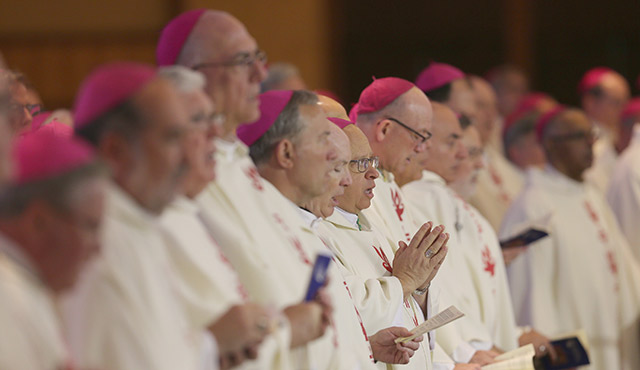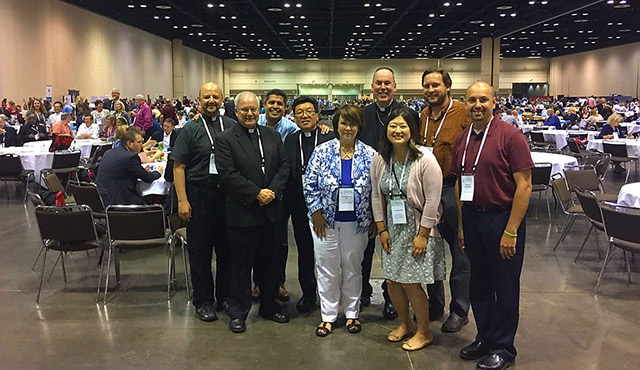The United States Conference of Catholic Bishops (USCCB) held an “unprecedented gathering” of more than 3,100 key leaders, both lay and clergy alike, including 155 bishops, at the Convocation of Catholic Leaders in Orlando from July 1-4.
Its goal, according to the USCCB, was to form and renew leaders “to share the Gospel as missionary disciples, while offering fresh insights informed by new research, communication strategies, and successful models.”
The USCCB looked to Pope Francis, whose words and actions have served as inspiration for effectively communicating the Gospel in today’s world, as a model for the convocation’s themes.
Particularly, the convocation participant guidebook cited Pope Francis’s 2013 exhortation, Evangelii Gaudium (The Joy of the Gospel), as an impetus “to examine today’s concerns, challenges, and opportunities in the light of the Church’s mission of evangelization.”
The delegation from the Diocese of Orange included Bishop Timothy Freyer; Michael Donaldson, director of the Office of Pastoral Care for Families in All Stages; Greg Walgenbach, director of the Office of Life, Justice and Peace; Armando Cervantes, director of Youth and Young Adults; Marissa Cornejo, Mission Office director; and Katie Dawson, director of Parish Faith Formation.
“I was impressed with the number of young adults who are so enthusiastic about Christ and the Church,” Bishop Freyer noted in reflecting on the convocation.
Prior to the event, Katie Dawson wondered about the feasibility of successfully convening such a large gathering on such critical topics. “I hoped that it would be focused on the fundamental call of the Church to evangelize and to begin with the person of Jesus, a call to encounter and relationship with Him, and with His Church,” she explained.
Dawson was pleased to find the convocation fulfilled her expectations, particularly in emphasizing that personal relationship with Jesus “as the starting point for everything we do.”
Speaking more about Jesus was also at the top of Greg Walgenbach’s personal list that he came away with from the convocation. By emphasizing the person of Jesus on the diocesan level, Walgenbach believes authentic expression of missionary discipleship and joyful witness to the Gospel would follow. Here again Pope Francis serves as an archetype for such outreach, such as his call at the 2013 World Youth Day in Brazil: “I want the Church to go into the streets!”
From his time spent at the convocation in Orlando—dubbed by some as World Youth Day for adults—Walgenbach saw this summons by the pope as a theme for revitalizing parishes within the Diocese of Orange. Walgenbach paraphrased Washington, D.C. priest Monsignor Ray East: “We need more street in the parish and more parish in the street.”
“We are convinced of the need to focus on two principal aspects of our evangelization as we move forward,” Walgenbach said. These are “articulating the mission of the church to proclaim the Gospel of Jesus and to demonstrate radical hospitality, both to those who meet us at our parishes and centers, as well as those whom we meet ‘on the way.’”
The USCCB considered the convocation “unprecedented” because it was nine years in the making. It shared its long road to realizing the Convocation of Catholic Leaders with participants. One of the issues that initially motivated organizers was to unite leaders from two areas of outreach that often appear disparate—pro-life and justice ministries. With the publication of Evangelii Gaudium by Pope Francis in 2013, the bishops had a foundation to build the convocation’s goals.
The keynote speaker, Bishop Robert Barron, auxiliary bishop of the archdiocese of Los Angeles, shared his enthusiasm for implementing missionary zeal and evangelization. In his live address delivered from EWTN’s West Coast Studio at Christ Cathedral, Bishop Barron cited not only Pope Francis, but also the saints throughout the centuries who inspired the people and culture around them.
The delegates from the Diocese of Orange have discussed translating the ideas, strategies, and enthusiasm from the Convocation of Catholic Leaders to everyday life in the diocese and parishes. “We need to look at how we do sacramental preparation to see if it is helping people to become disciples of Jesus Christ,” Bishop Freyer explained. The hope is for “our people to grow more comfortable sharing their faith,” while assisting parishes to be ‘missionary disciples’,” the bishop said.
Katie Dawson pointed to the prayer from the Convocation of Catholic Leaders as a meditative motivator: “Move us to welcome the word of life in the depths of our hearts and respond to the call of missionary discipleship,” reads part of the petition.
“We hope to explore how our parish communities and our diocesan offices will make structural, institutional, and ‘people of God’ commitments to make them,” Walgenbach said, quoting the Pope from Evangelii Gaudium, “‘nearer to people…environments of living communion and participation…and completely mission-oriented.’ What an amazing invitation!”


